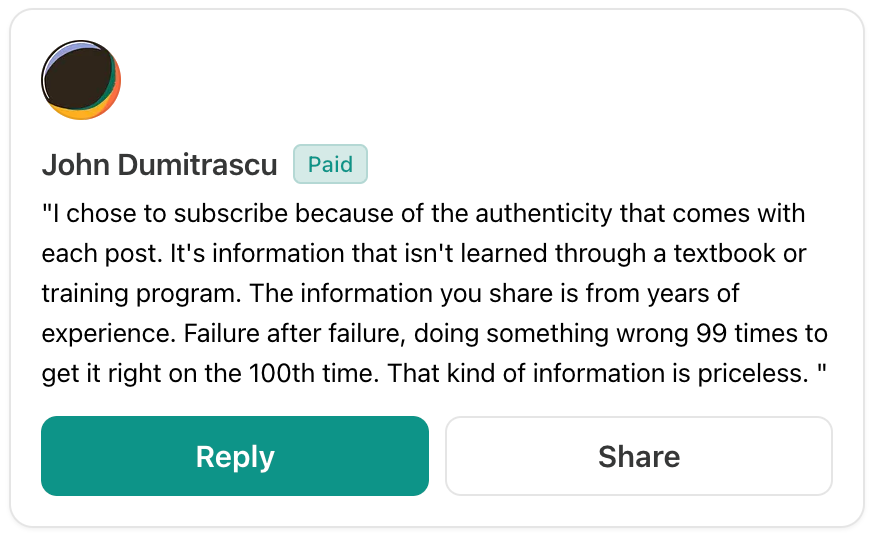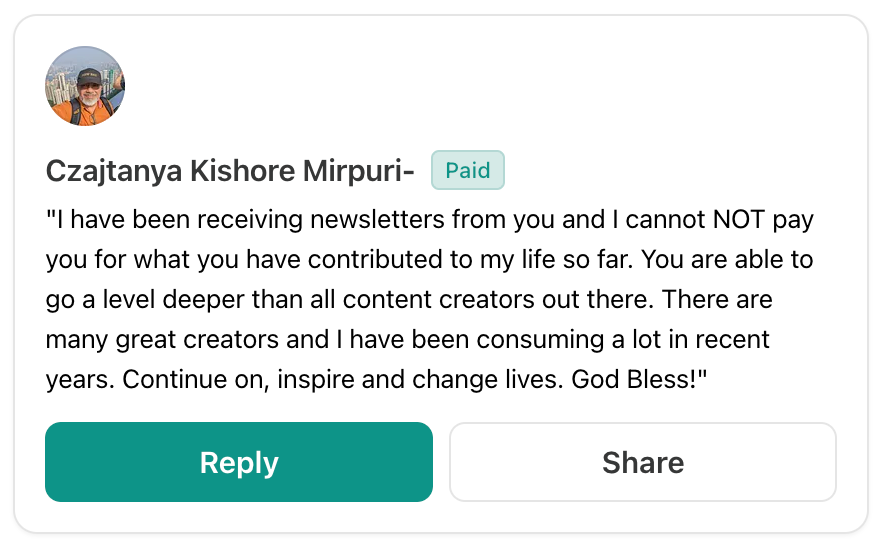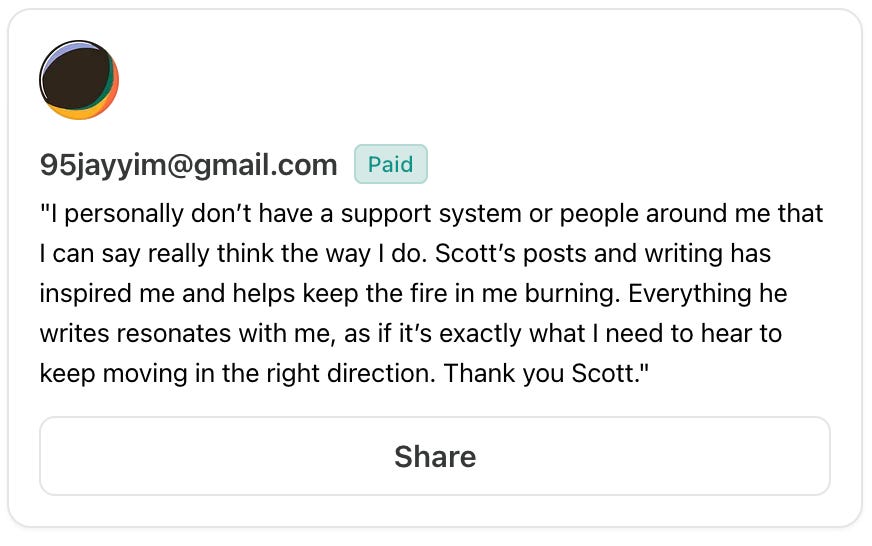Thoughts of the Week: July 28th, 2025
Real advice is expensive to give and expensive to receive.
You’ve read the free edition of Scott’s Newsletter. For more insights, including weekly deep dives, powerful ideas & proven strategies from my work with some of the world's most successful people, click here to become a paid subscriber.
The Advice Trap
There's a difference between asking for advice and asking for permission.
One seeks truth. The other seeks comfort.
We've confused the two so completely that most "advice" conversations are just elaborate permission rituals disguised as decision-making.
The permission theater
I watch this happen constantly. Someone calls to "get your thoughts" on their relationship, their living situation, their family drama.
They spend twenty minutes explaining their situation. They've been thinking about it for months. They've weighed all the options. They've already started making moves.
Then they ask: "What would you do?"
But they don't want to know what I would do. They want me to validate what they're already doing. They want external approval for an internal decision they've already made.
So I give them what they're really asking for: I reflect back their strongest points. I ask gentle questions that let them talk through their reasoning. I offer supportive modifications around the edges.
They leave feeling validated. I leave feeling complicit in a charade.
The advice addiction
We've become advice addicts, not because we need guidance, but because we're terrified of responsibility.
The person who asks five friends before ending the relationship they know is wrong.
The one who polls their family before making the move they've been planning for months.
The parent who needs reassurance from other parents before trusting their own instincts.
They're not collecting wisdom. They're collecting insurance policies against regret.
The friend's dilemma
Here's what real advice sounds like:
"You're staying because you're scared, not because it's right."
"You've been complaining about this for two years—either fix it or leave."
"You already know what you need to do."
But giving real advice kills relationships. The person asking doesn't want truth—they want ammunition for the decision they've already made.
So you learn to be supportive instead of honest. You learn to validate instead of guide.
Everyone gets what they think they want. Nobody gets what they actually need.
The crowd-sourced delusion
Ask enough people and you'll eventually get the answer you want.
If four friends tell you to leave him and one says "relationships take work," guess which conversation you remember? Guess who becomes your "wise friend"?
We've learned to shop for advice like we shop for everything else—keep looking until someone confirms what we already believe.
The advice isn't guiding the decision. The decision is guiding which advice we accept.
The responsibility transfer
The real function of advice-seeking isn't information gathering. It's responsibility distribution.
If your therapist said it was normal, it's not entirely your fault if you're wrong. If your mom said to give it more time, you can't be blamed for waiting. If everyone told you to follow your heart, how could you have known it would lead you astray?
We're not looking for better decisions. We're looking for shared accountability for the decisions we've already made.
The advice audit
Look at your last major life decision. How much time did you spend:
Asking people what they thought vs. deciding what you thought?
Seeking opinions vs. sitting with your own feelings?
Looking for validation vs. looking for truth?
The ratio reveals whether you were deciding or performing the act of deciding.
The expensive honesty
Real advice is expensive to give and expensive to receive.
It's expensive to give because it risks the friendship. It's expensive to receive because it might mean admitting you already know the answer.
So most advice transactions happen in the comfort zone: supportive generalities that make everyone feel good and change nothing.
The expensive stuff—the insight that actually shifts your perspective—only happens when someone cares more about your growth than your comfort.
The self-trust crisis
We've outsourced so much decision-making to our network that we've forgotten how to trust our own judgment.
We know our relationship isn't working, but we ask friends if we should stay. We know we want to move, but we ask family if it's smart. We know what feels right for our kids, but we ask other parents if it's okay.
We've confused consensus with correctness. Popular opinion with personal truth.
The decision trap
In a world full of advisors, actually trusting yourself is a radical act.
It means disappointing the part of you that wants agreement before action. It means looking impulsive to people who mistake consultation for wisdom.
But it also means taking responsibility for your life instead of letting others steer it.
The question isn't whether you have enough advice. The question is whether you have enough self-trust.
Thank you for reading,
Scott
Important Ideas
Your vision isn't a democracy. Not everyone gets a vote on your life direction, and that's not cruel, it's necessary. The people who don't fit aren't wrong, they're just heading somewhere else. But we're so terrified of looking exclusive that we water down our dreams until they're acceptable to everyone and exciting to no one. You can't build something meaningful while managing everyone's feelings about your choices. Stop trying to include people who want you to stay small.
Happiness is a sugar rush. Gratitude is a well-balanced meal. We treat happiness like it's the goal, chasing it from promotion to relationship to purchase. But happiness is just a feeling that comes and goes based on circumstances. Gratitude is a practice that changes how you see the circumstances. Happy people aren't grateful because life is easy. Life feels easier because they're grateful. You're sitting there waiting for your life to get good enough to appreciate when you could just appreciate it now and watch it get better.
"I'm not ready" is just fear wearing a productivity costume. Life goes to the people who say yes and figure it out later, not the people who figure it out and then say yes. You're never going to feel ready for anything important. Ready is a myth sold by people who want you to stay exactly where you are. The people winning aren't more qualified, they're more willing to look stupid temporarily. Stop preparing to live and start living.
External competition turns you into a professional stalker. You're constantly checking what everyone else is doing, adjusting your path based on their moves, playing their game with their rules. It's exhausting and pointless. You know what's not exhausting? Competing with who you were yesterday. External competition asks "How do I beat them?" Internal competition asks "How do I stop being mediocre?" One makes you paranoid. The other makes you better. Stop watching the scoreboard and start watching yourself.
Your salary has a ceiling. Your thinking doesn't. Your boss isn't plotting to make you wealthy. They're plotting to keep you just happy enough to stay and just unhappy enough to not ask for more. Meanwhile, you're celebrating Friday like a prisoner celebrating yard time while the people building real wealth are treating weekends like overtime. They're not working harder, they're working on assets instead of assignments. Stop thinking like an employee and start thinking like an owner.












This was such an insightful piece. So many nuggets but what struck me was your statement. "Real advice is expensive to give and expensive to receive" - and I realized, the most expensive advice is no advice at all.
Scott, I agree that asking people can be a clutch and it takes courage to listen to advice that we disagree with.
I also suspect you are a strong decision maker. Some of us are not. The Myer-Briggs and the Kolbe are among personality inventories that distinguish personality types based on the way people make decisions.
I’m also pondering your advice to trust yourself. Yes, there are times when this is the best advice. But I also have seen times when the mind that created the problem is using the same flawed logic to solve the problem
How do you distinguish the person who has genuine difficulty in making up their mind because they can see pros and cons of the different options versus the person who is simply seeking confirmation?
How do you distinguish between when it’s right to trust yourself and when you’re engaged in self deception?